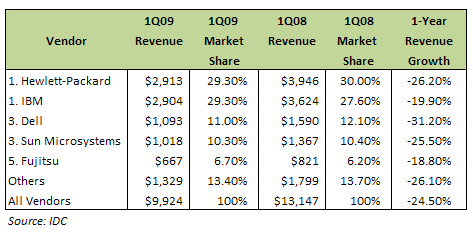Three Reasons Why the Future of Storage is Open Source and Cloud – Part 2
Last week we posted the first (in a 3 part series) on why the future of storage is Open Source and cloud. And now, without further ado, we present the 2nd part of the series.
2) Storage virtualization disrupts traditional vendor business models
While IT has reaped the benefits of better resource use and cost reductions, this has come at the expense of sales for vendors. As adoption of server virtualization took off, server sales plummeted, moving from a steady gain in volume and value every quarter to a catastrophic drop. In 2009, with the recession in full force (itself a significant driver of virtualization for cost savings) analysts at IDC recorded the first ever drop in server sales. All the big players, HP, IBM, Dell, Sun Microsystems (now Oracle) and Fujitsu, recorded huge decreases in sales, between 18.8 percent and 31.2 percent year on year. The impact was softer in high power CISC and RISC segments where it was tougher for IT teams to change vendors (e.g., with mission-critical Oracle applications where licensing costs were tied to the number of processors in use or specific hardware), but especially severe in the lower end x86 market.
Changes followed suit. IBM exited the commodity market altogether, selling out to Lenovo, who with a cheaper manufacturing base built on lower wages and controlled exchange rates were in a better position to win. HP endured a merry-go-round of revolving door CEOs and successive re-inventions, and Dell went private. This pattern of disruptive change is set to follow into the storage marketplace.
When even the very largest suppliers suffer in this way, an expectation builds of disruptive, game-changing technology. IT buyers stop looking at brand in the same way. Where there used to be a perception of safe partners with a long-term, safe product road maps and low risk, there is now an expectation that the older players are going to be challenged by new companies with new approaches and technologies. The famous 70s slogan “no-one ever got fired for buying IBM” doesn’t hold water when IBM shuts up shop and sells it commodity servers business.. IT buyers expect the same disruption in storage, and they are right to do so.
In this environment, the status quo for storage vendors cannot hold. The big players are nervously eying each other, waiting for the deciding moves in what adds up to a game of enterprise business poker with astronomical odds. The old proprietary business model is a busted flush, and they all know that sooner or later someone will call their bluff on price and lock down software. A new player in the game, or even somebody already at the table, is going to bring the game into a new phase –or, as distinguished Gartner analyst and VP Joe Skorupa put it, “throw the first punch” in 2016.
In the next article: #3 – Cloud makes the case for open source compelling, because data must be portable.
Written by Jason Phippen

No comments yet